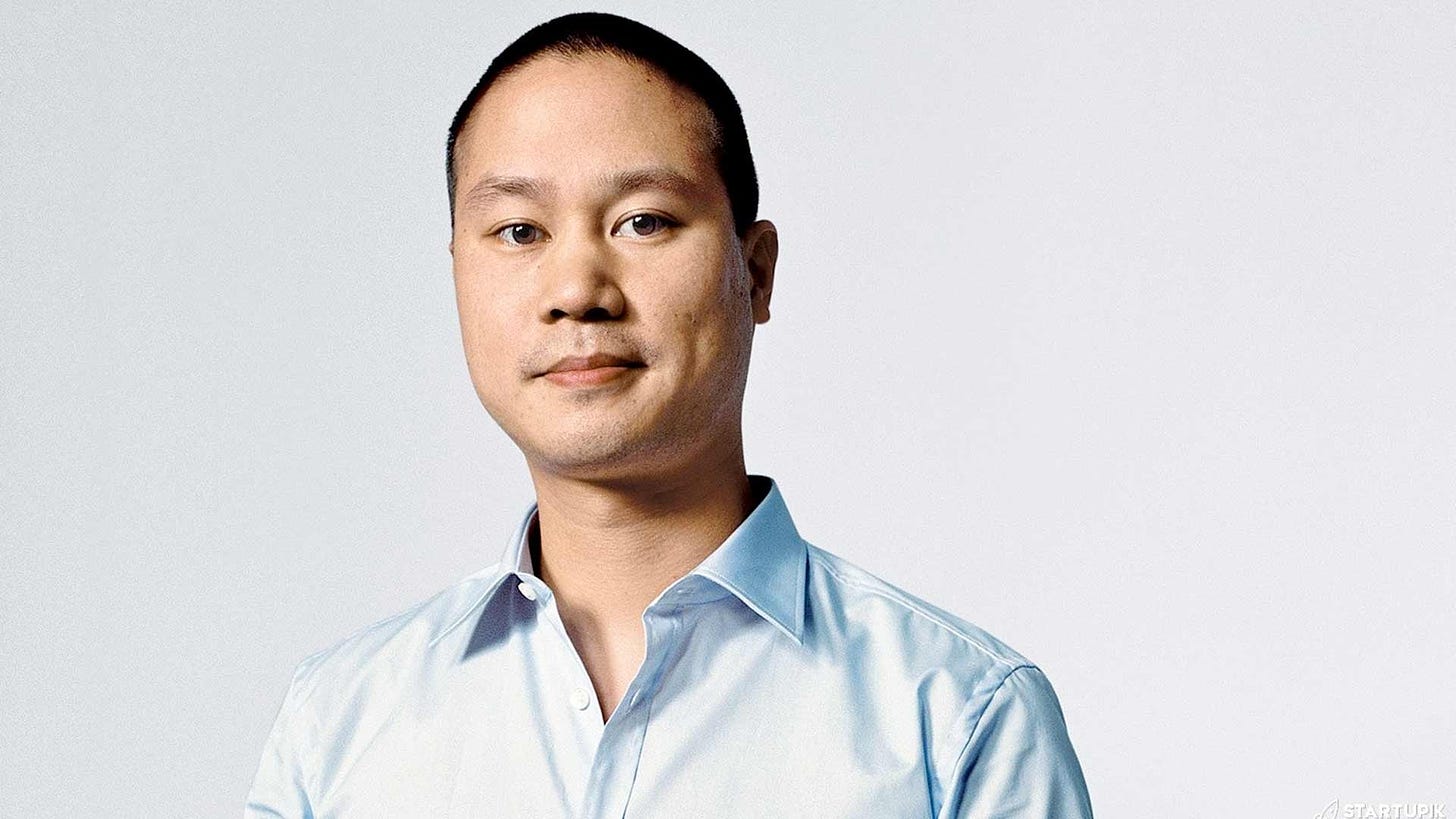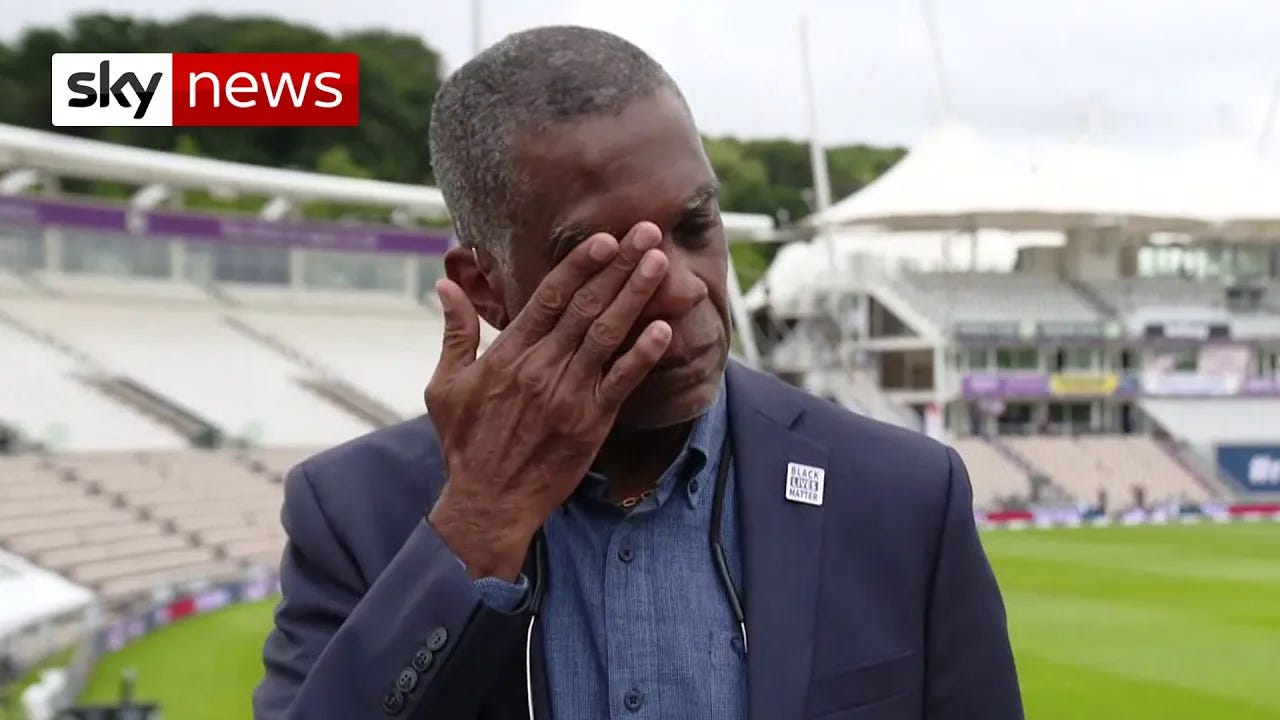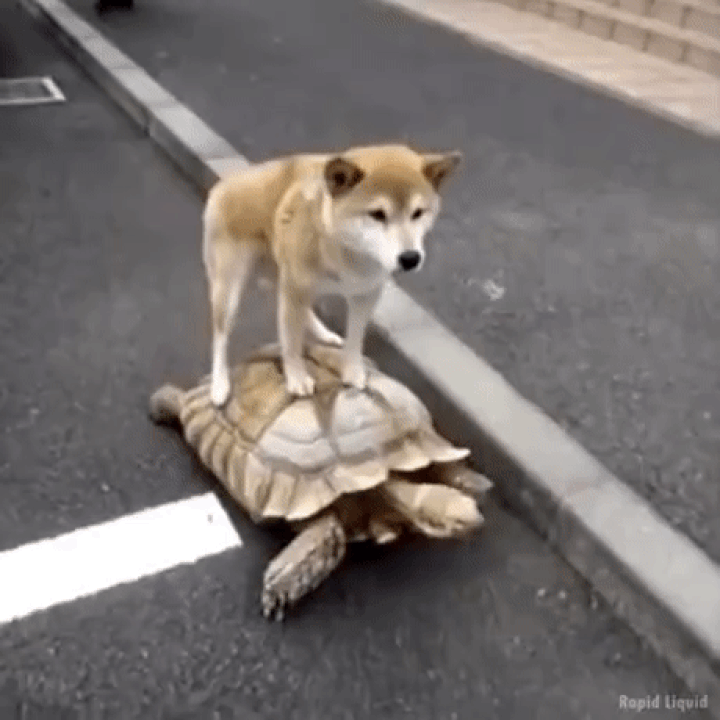You Don’t Need More If You Have Enough
Or, why more money is not equal to more success or happiness
Happy Sunday!
This is the 50th edition of Sunday Wisdom. Having published it for 50 consecutive weeks, I’m pretty psyched! Thanks for being a reader. I couldn’t have done it without you guys. Because then I would be writing and talking to myself every week, which would be kind of creepy. Here’s to the next 50 editions! 🥂
Now it’s the time for your weekly dose of multidisciplinary reading to upgrade your thinking and decision making skills. If you’re enjoying Sunday Wisdom, share it with a friend! If you’re seeing this newsletter for the first time, you can subscribe here.
Onto this week’s essay!
In 1995, fresh out of college, Tony Hsieh got a $40k per year job at Oracle.
He soon resigned to build a web-design firm called Internet Marketing Solutions with his friend. He had been at Oracle for 5 months and, in his own words, didn’t really accomplish anything.
Within a week, Hsieh and his friend realised that web design wasn’t really their passion. After few weeks of boredom and web surfing they launched an advertising platform called LinkExchange. In just 5 months they got an offer to sell off the platform for $1 million. The founders countered with $2 million, but the sale didn’t happen. Couple of months later, the company had grown to 25 employees when Yahoo! came up with an offer of $20Mn to buy LinkExchange.
Hsieh thought of all he could do with the money: buy a house, a new big-screen TV, a home theatre, go on mini vacations, get a new computer, or maybe start another company. Except for buying a house, he figured he had enough money to do all he wanted. And it sounded silly to sell a company he is excited about to start another company to be excited about. His cofounders independently came to the same conclusion, so they decided to turn down Yahoo!’s offer.
“We are living in a very special time,” I said. “The Internet industry is exploding. Companies like Netscape, eBay, Amazon, and Yahoo! are changing the course of human history. Never before have so many companies become successes in such a short period of time. We have the opportunity to be one of those companies while having the time of our lives.”
In the next few months, LinkExchange raised $3 million from Sequoia Capital, and within 2 years they had over a hundred employees. It was when the cracks started to appear.
The short story is that we simply didn’t know we should have paid more attention to our company culture. During the first year, we’d hired our friends and people who wanted to be part of building something fun and exciting. Without realising it, we had together created a company culture that we all enjoyed being a part of.
Couple of days later, Hsieh had trouble getting up from bed in the morning to go to office. It was like Oracle all over again.
…as we grew beyond twenty-five people, we made the mistake of hiring people who were joining the company for other reasons. The good news was that the people we hired were smart and motivated. The bad news was that many of them were motivated by the prospect of either making a lot of money or building their careers and résumés. They wanted to put a few years of hard work into LinkExchange and then move on to their next résumé-building job at another company. Or, if things worked out well, make a lot of money and retire.
Finally, in late 1998, Microsoft came up with an offer of $265 million to buy LinkExchange, and this time there were no second thoughts. And, even though it was a lot of money, there wasn’t much happiness in it.
We weren’t excited. We weren’t cheering. We knew the outside world probably thought we were jumping up and down and doing cartwheels, but instead our mood was a strange mix of apathy and relief.
There were some strings attached to the deal. Microsoft wanted Hsieh and his cofounders to stay on for at least 12 months to walk away with $40 million. If not, he would have to give up $8 million of that. He relented.
Even though LinkExchange was no longer fun for me, I figured that I could stick around for another year at that rate. I just had to do the bare minimum amount of work so that I wouldn’t get fired.
After the deal, Hsieh bought all he wanted to buy: a place to live, a big-screen TV, a computer, and a home theatre. But they weren’t enough to make him happy.
You need “just enough” money to be happy. More than that is good to have—might help you in keeping scores with others—but doesn’t add much in terms of happiness. The return diminishes over time.
…most of my free time was spent just being introspective and thinking. I didn’t need more money, so what was it good for? I wasn’t spending the money I already had. So why was I staying at Microsoft, vesting in peace, trying to get more of it?
But, how much is just enough? It varies. For some, it might be a few thousands, while for others, it might be millions. Depends where you start from. If you’ve come from wealth, your just enough won’t be the same as someone who has come from poverty. But irrespective of how much money you have, you’ll always need purpose, reason to get out of bed in the morning.
Notice that I didn’t say you need happiness. Because happiness is often realised in retrospect—once you have moved away from the trees, and are able to see the forest. Unhappiness, on the other hand, can always be experienced in realtime.
In 2016, when I was broke, living with friends while working on my startup idea, I had the best days of my life. In retrospect, I was very happy. But I released that only after I had moved on from that life. Similarly, high school was the best period of my life as a kid. I didn’t release that until I went to college. In a couple of years when we’ll look back at 2020, maybe it won’t seem all that bad after all. Happiness is best realised in remembrance.
After selling his company and moving to Microsoft Tony Hsieh realised the same. He was unhappy. This made him realise what really made him happy. It was working with friends on things he was passionate about.
I made a list of the happiest periods in my life, and I realised that none of them involved money. I realised that building stuff and being creative and inventive made me happy. Connecting with a friend and talking through the entire night until the sun rose made me happy. Trick-or-treating in middle school with a group of my closest friends made me happy. Eating a baked potato after a swim meet made me happy. Pickles made me happy.
There are moments in life when no matter how rational a decision seems, you just cannot bring yourself to do it, because the emotional compromise is just too high. Had Tony Hsieh been broke, he would have stayed on at Microsoft, but since he had enough, he had second thoughts. Since he had enough, he had the perspective to weigh things and see what he was having to give up for the money. Having enough gave him leverage—not to get controlled by the circumstances.
Tony Hsieh, who would later go on to become the CEO of Zappos that Amazon would buy for $1.2 billion 10 years later, left Microsoft soon after that. He didn’t get the full $40 million since he didn’t stay for 12 months.
I like this story. I revisit it whenever I cannot bring myself to do something that seems rational. This story reminds me to ask the question, do I have enough? Is the price I’m paying for being rational too high? If I walk out of it, would I be able to live with it? If I’m honestly able to answer ‘yes’ to all of these, the decision to walk away—from more money, more success, or more recognition—isn’t irrational. Because you don’t need more if you have enough.
🤞 Unpopular Opinion
Are you working on your best idea?
Many would say that ideas don’t have any value. What matters is execution. That is partly true. Execution does matter, but you cannot discount the value of an idea.
If you’ve got two ideas, you would be more enthused to work on the idea you personally prefer. If one is something to do with gardening, which you are passionate about, and the other is about teaching guitar online, which you are okay with, the first idea is a better choice. If executed well, it much more likely to be a better success than the second idea.
So let me go back to my original question. Are you working on your best idea?
📑 I Enjoyed Reading
Why Walking Helps Us Think — “When we go for a walk, the heart pumps faster, circulating more blood and oxygen not just to the muscles but to all the organs—including the brain. Walking on a regular basis also promotes new connections between brain cells, staves off the usual withering of brain tissue that comes with age, increases the volume of the hippocampus (a brain region crucial for memory), and elevates levels of molecules that both stimulate the growth of new neurons and transmit messages between them.”
Why Beginners Should Teach — “Beginners acutely feel the struggles of other beginners: confused with the onslaught of tools, terminology, and where to begin. The initial hurdle is the hardest. It's the place where quitting seems most appealing because there's an endless supply of things to learn.”
The Truth Is Paywalled But The Lies Are Free — “This doesn’t mean the paywall shouldn’t be there. But it does mean that it costs time and money to access a lot of true and important information, while a lot of bullshit is completely free.”
📹 I Enjoyed Watching
Michael Holding Breaks Down Discussing Racism in The UK — “The ex-West Indies cricketer and Sky Sports commentator was discussing the racism experienced by his parents when he was overcome by emotion.”
Your Brain Gets Smart, But Your Head Gets Dumb — “There’s lots in here that I don’t explain fully, but one thing I wanted to talk about more is why I think that online school is definitionally less valuable than in-person school.”
HULK - “I’m Always Angry” Flipbook — “It took me more than 3 months to complete this video. It means I spent more than 60 days on 1,093 Hulk drawings.”
🤔 Worth Thinking About
Out of every hundred new ideas ninety-nine or more will probably be inferior to the traditional responses which they propose to replace. These are the wisdom of generations after centuries of experiment in the laboratory of history. So the conservative who resists change is as valuable as the radical who proposes it — perhaps as much more valuable as roots are more vital than grafts. It is good that new ideas should be heard, for the sake of the few that can be used. But it is also good that new ideas should be compelled to go through the mill of objection.
— Will and Ariel Durant, The Lessons of History
Thanks for reading! If you enjoyed this edition of Sunday Wisdom, do me a solid and hit the ❤️ button. Did anything stand out? I’d love to hear about it. You can write in the comments, or reply to this email.
If you’re one of my many new email signups since last week, hello, and welcome! Sunday Wisdom publishes every Sunday, duh! It contains a wide range of useful ideas—in the form of original long-form articles, bite-sized wisdom, interesting facts, article and video recommendations, quotes, and more. I try to make it one of best emails you read the whole week.
My website is called Coffee&Junk, so I naturally love coffee. If you like my work, and want to buy me a cup, I’m game!
👋 Goodbye GIF
If you wish to get in touch, DM me on Twitter or Instagram, or simply reply to this email. I hope you have a great day, and thank you for making Sunday Wisdom a part of it.
Best,
Abhishek







